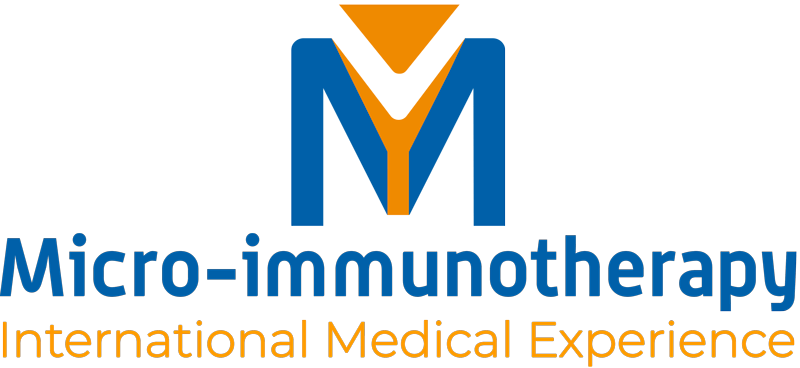(If you click on it, you will go directly to that part of the post)
MCAS, short for Mast Cell Activation Syndrome, is a medical condition affecting 17% of the world population in which, unlike mastocytosis, there is a normal amount of mast cells but they are dysfunctional and hyperreactive.
MCAS manifests as a multifaceted, multisystem disease with often unexplained symptoms that vary from patient to patient. These symptoms are linked to a state of hyperinflammation caused by a cytokine storm in response to certain stressors, and are indicative of an immune system that is unable to respond appropriately and efficiently to certain challenges.
By transmitting sequential information to the immune system through low doses of immune messenger substances, micro-immunotherapy aims at rebalancing the immune response in MCAS and thus addresses its underlying causes.
What Are Mast Cells?
Mast cells are long-lived cells of the innate immune system found mainly in tissue of the skin, mucosa, respiratory tract, brain, gastrointestinal tract, the uterus and ovaries. They have multiple surface receptors that react to various stimuli such as food, chemicals, stress, physical exercise or temperature changes.
Mast cells release inflammatory mediators (over 200) such as histamine, heparin, inflammatory cytokines, prostaglandins or leukotrienes. In general, they are activated in hypersensitivity reactions, in response to infections, and in allergic reactions.
Physiological Functions of Mast Cells
Mast cells have several physiological functions, such as attraction and activation of effector cells, direct antimicrobial action, tissue remodelling, and regulation of angiogenesis. In general, they act as links between innate and adaptive immunity, as they release inflammatory mediators that activate a wide range of cells of both the non-specific and the specific immune response.
Mast Cell Activation Syndrome (MCAS)
MCAS: Definition
As said above, MCAS is a multisystem disease caused by an overactivation of mast cells, which release mediators and cytokines in an uncontrolled manner. The manifestations of MCAS vary depending on factors such as the specific location and type of released mediators, the distribution of receptors, and the body’s capacity to degrade these mediators. Consequently, MCAS is characterised by a diverse array of symptoms:
· Constitutional: fatigue, fever, shivering, weight loss, weight gain
· ENT: conjunctivitis, cold, sinusitis, loss of smell and/or taste, tinnitus, hearing loss, sore throat.
· Nerves: headache, migraines, clouding of consciousness, anxiety, depression, insomnia, seizure.
· Cardiovascular system: chest pain, palpitations, low blood pressure, arrhytmias.
· Lungs: coughing, shortness of breath, wheezing.
· Stomach: upper abdominal discomfort, nausea, vomiting.
· Intestines: bloating, food intolerances, abdominal pain, diaorrhea, constipation.
· Musculoskeletal system: muscle and bone pain, oedema.
· Skin: redness, itching, hives, skin rashes, hair loss.
MCAS: Causes
The causes of MCAS are numerous, often involving a combination of various factors that contribute to mast cell dysfunction. These factors / triggers include:
· Chronic stress
· Trauma
· Lack of sleep
· Malnutrition
· Micronutrient deficiencies
· Hypersensitivity
· Chronic infections
· Silent inflammation
· Vaccinations
· Heavy metals
· Toxins
· Local foci
· Metabolic disorders
· Chronic pain
· Hormonal fluctuations
· Detoxification disorders
· Gene polymorphisms
· Mitochondriopathies
If left untreated, MCAS can over time lead to the development of chronic inflammatory diseases.
Immunoregulation Through Micro-immunotherapy in MCAS
Diagnosing MCAS is complicated and largely depends on patient survey, thourough anamnesis and specific laboratory tests. If an MCAS is confirmed, treatment may be based on the removal of the triggers, promotion of intestinal health, mast cell stabilisation and/or neutralising the effect of the mediators released.
Micro-immunotherapy uses low doses of cytokines and other immune mediators, thereby speaking the same language as the immune system, the function of which it aims to regulate in a gentle and targeted manner.
As part of an integrated treatment strategy aimed at restoring homeostasis in patients affected by MCAS, micro-immunotherapy can be used to support the immune system in infection control and reduce / control exacerbated inflammatory processes.
- Afrin LB, et al. Diagnosis of mast cell activation syndrome: a global “consensus-2”. Diagnosis (Berl). 2020 Apr 22;8(2):137-152. doi: 10.1515/dx-2020-0005
- Vacheron N, McClinton T, Lynch-Smith DJ, Umberger R. Mast cell activation syndrome. J Am Assoc Nurse Pract. 2020 Apr 8;33(7):545-552. doi: 10.1097/JXX.0000000000000396. PMID: 32282570.

